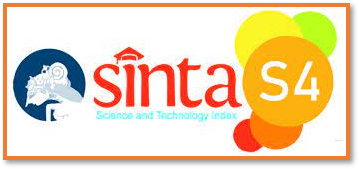Association between Family Support and Depression Among Elderly Patients with Type 2 Diabetes Mellitus at Samarinda City Public Health Center
Abstract
Diabetes mellitus (DM) is a metabolic disorder in carbohydrate, lipid and protein characterized by hyperglycemia resulting from defects in insulin secretion, insulin action, or both. Elderly people with DM are very susceptible to depression. Depression can worsen the medical condition of people with DM. Family Support is one of the factors that can influence the depression status in elderly DM patients. The purpose of this study was to determine the relationship between family support and the level of depression in older people with type 2 DM at the Samarinda City Public Health Center. This was an analytical observational research design with a cross-sectional survey approach on three public health centers in Samarinda City. Two research instruments were used such as the Family APGAR questionnaire and the Geriatric Depression Scale (GDS) form, with topics of family support and elderly depression respectively. Sampling was done by purposive sampling technique and obtained 68 respondents. The results showed that 45 respondents (66,2%) perceive "excellent" family support whilst 23 respondents (33,8%) perceive "poor" family support. The research data upon depression level gathered 52 (76,5%) respondents did not experience depression whereas the other 16 (23,5%) respondents experienced moderate depression. The results of statistical tests on independent variables and dependent variable using Chi-Square test produced p-value <0.05. The conclusion of this study is that there is relevance between family support and its impact to the stage of older adults depression who suffer from type 2 DM at the Samarinda City Public Health Center (p-value = 0.000, OR 18,200).
Full Text:
PDFReferences
Subdirektorat Statistik Pendidikan dan Kesejahteraan Sosial BPS. Statistik Penduduk Lanjut Usia 2020. Subdirektorat Statistik Pendidikan dan Kesejahteraan Sosial, editor. Badan Pusat Statistik. Jakarta: Badan Pusat Statistik; 2020. 261 p.
PERKENI. Pengelolaan dan Pengobatan Diabetes Melitus Tipe 2 Dewasa. Pedoman Pengelolaan dan Pencegah Diabetes Melitus Tipe 2 di Indones. 2019;1:132.
Luthfa I, Ardian I. Effects of Family Empowerment on Increasing Family Support in Patients with Type-2 Diabetes Mellitus. Nurse Media J Nurs. 2019;9(1):58.
Widhiantara I. Diabetes Fakta dan Angka. J Kesehat. 2018;
Atlas D. International diabetes federation. IDF Diabetes Atlas, 7th edn Brussels, Belgium Int Diabetes Fed. 2015;
Dinkes Kota Samarinda. Badan Pusat Statistik [Internet]. 2019. Available from: https://samarindakota.bps.go.id/statictable/2019/09/10/224/umlah-kasus-10-penyakit-terbanyak-di-kota-samarinda-2018
Tamara E, Bayhakki, Annis Nauli F. Hubungan atara Dukungan Keluarga dan Kualitas Hidup Pasien Diabetes Mellitus Tipe II Di RSUD Arifin Achmad Provinsi Riau. Jom Psik. 2014;1(2):1–7.
Atyanti I, Saryono. Hubungan Depresi Dan Dukungan Keluarga Terhadap Kadar Gula Darah Pada Pasien Diabetes Melitus Tipe 2 Di Rsud Sragen. J Keperawatan Soedirman. 2010;5(1):37–46.
Elvira S. Buku Ajar Psikiatri. 3rd ed. Hadisukanto G, editor. Depok: BP FKUI; 2017. 640 p.
Sweileh WM, Abu-Hadeed HM, Al-Jabi SW, Zyoud SH. Prevalence of depression among people with type 2 diabetes mellitus: a cross sectional study in Palestine. BMC Public Health. 2014;14(1):1–11.
Nareswari PJ, Gunadi E. Depresi Pada Lansia: Faktor Resiko, Diagnosis dan Tatalaksana. J Med Hutama. 2021;2(02 Januari):562–70.
Mayberry LS, Osborn CY. Family support, medication adherence, and glycemic control among adults with type 2 diabetes. Diabetes Care. 2012 Jun;35(6):1239–45.
Hensarling J. Development and psychometric testing of Hensarling’s Diabetes Family Support Scale. 2009.
Irawan E, Alfatih H, . F. The Effectiveness of Family Peer Group Education Intervention on Family Support of Type II Diabetes Mellitus Patients. KnE Life Sci. 2019;2019:212–9.
Meidikayanti W, Wahyuni CU. Hubungan Dukungan Keluarga dengan Kualitas Hidup Diabetes Melitus Tipe 2 Di Puskesmas Pademawu. J Berk Epidemiol. 2017;5(2):240–52.
Windani C, Abdul M, Rosidin U. Gambaran Self-Manajemen Pada Pasien Diabetes Melitus Tipe Ii Di Puskesmas Tarogong Kabupaten Garut. J Kesehat Komunitas Indones. 2019;15(1).
Erda R, Harefa CM, Yulia R, Yunaspi D. Hubungan Dukungan Keluarga dan Stres Dengan Kualitas Hidup Lansia Diabetes Mellitus Tipe II. J Keperawatan. 2020;12(4):1001–10.
PERKENI. Pedoman Pengelolaan dan Pencegahan Diabetes Melitus Tipe 2 Dewasa di Indonesia 2021. Glob Initiat Asthma [Internet]. 2021;46. Available from: www.ginasthma.org.
Maulida L, Nurhasanah N, Juanita J. SELF-CARE AGENCY PADA LANSIA DENGAN DIABETES MELLITUS. J Ilm Mhs Fak Keperawatan. 2021;5(2).
Setiati S. Buku Ajar Ilmu Penyakit Dalam. 6th ed. Setiawati S, W. Sudoyo A, Alwi I, Setiyohadi B, Syam AF, editors. Buku Ajar Ilmu Penyakit Dalam Jilid II. Jakarta: Interna Publishing; 2014.
Mufidah S. Gambaran Tingkat Depresi pada Pasien Diabetes Melitus Dengan Keluhan Penyerta di RSUD dr. Moewardi Surakarta. 2018;7(2):44–68.
Pudyasti B. Disusun oleh: BEKTI PUDYASTI 201310201012. Naskah Publ. 2017;
Sarfika R. Hubungan Keputusasaan dengan Depresi pada Pasien Diabetes Melitus di Padang. NERS J Keperawatan. 2019;15(1):14.
Maryam RS, Ekasari MF, Rosidawati J. Mengenal Usia Lanjut dan Perawatannya. Mengen Usia Lanjut dan Perawatannya Salemba Med. 2008;
Supriati L, Nasution TH, Ilmansyah FA. Hubungan Dukungan Keluarga dengan Kejadian Depresi pada Pasien Diabetes Mellitus di Rumah Sakit Muhammadiyah Gresik. Maj Kesehat FKUB. 2017;3(4):183–9.
Ramadhani D, MM F, Hadi R. Karakteristik, Dukungan Keluarga dan Efikasi Diri pada Lanjut Usia Diabetes Mellitus Tipe 2 di Kelurahan Padangsari, Semarang. J Ners Lentera. 2016;4(2):142–51.
Irawan H. Gangguan depresi pada lanjut usia. Cermin Dunia Kedokt. 2013;40(11):815–9.
DOI: http://dx.doi.org/10.30872/j.kes.pasmi.kal.v7i1.8761
Refbacks
- There are currently no refbacks.
Indexing by :










